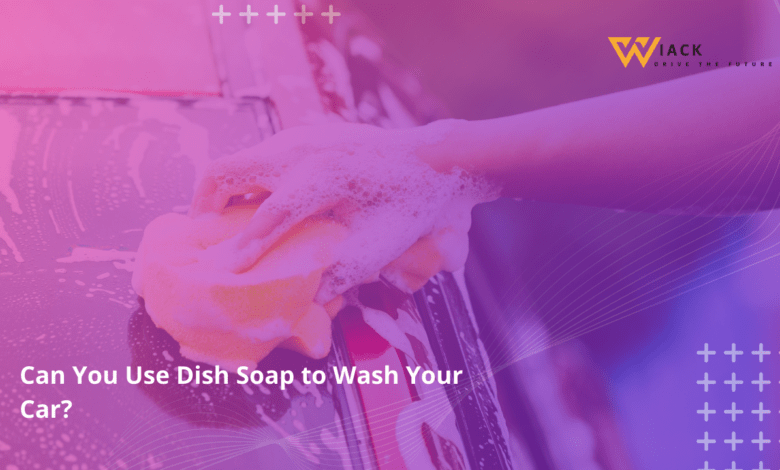Can You Use Dish Soap to Wash Your Car?

Did you know that over 41 million speeding tickets are issued in the United States each year? While that statistic may seem unrelated to car washing, it highlights how many people own and operate vehicles – and all those cars need regular cleaning. This brings us to a common question many car owners ask: Can you use dish soap to wash your car? In this comprehensive guide, we’ll explore the pros and cons of using dish soap on your vehicle and provide you with all the information you need to make an informed decision about your car care routine.
Introduction
When it comes to keeping our cars clean, we often look for convenient and cost-effective solutions. One option that frequently comes to mind is using dish soap to wash your car. After all, if it’s good enough to clean our dishes, why not our vehicles? However, before you reach for that bottle of Dawn or Palmolive, it’s essential to understand the differences between dish soap and car wash soap, as well as the potential impacts on your vehicle.
What is Dish Soap?
Dish soap, also known as dishwashing liquid or detergent, is a cleaning product specifically formulated to remove food residues, grease, and bacteria from dishes, cutlery, and cooking utensils. These soaps are designed to be tough on grease and food particles while being gentle enough for regular use on kitchenware.
Key characteristics of dish soap include:
- High surfactant content for cutting through grease
- Strong degreasing agents
- Ability to produce abundant suds
- pH levels that can vary from neutral to slightly alkaline
While these properties make dish soap excellent for cleaning dishes, they may not be ideal for your car’s delicate surfaces.
What is Car Wash Soap?
Car wash soap, on the other hand, is specially formulated to clean automotive surfaces without damaging the paint, clear coat, or other delicate materials found on vehicles. These soaps are designed to remove dirt, grime, and light grease while preserving the protective wax or sealant on your car’s paint.
Key features of car wash soap include:
- Balanced pH levels (typically neutral)
- Gentle cleaning agents that don’t strip wax or sealants
- Lubricating properties to reduce the risk of scratching during washing
- Additives that enhance shine and protection
Car wash soaps are engineered to provide effective cleaning while minimizing the risk of damage to your vehicle’s finish.
The Pros and Cons of Using Dish Soap
Now that we understand the basic differences between dish soap and car wash soap, let’s explore the pros and cons of using dish soap to wash your car.
Pros
Cost-Effective
One of the main reasons people consider using dish soap to wash their cars is the cost. Dish soap is generally less expensive than specialized car wash products, especially when you consider that you likely already have it in your home. This can make it an attractive option for budget-conscious car owners.
Availability
Another advantage of dish soap is its widespread availability. You can find it in virtually any grocery store, convenience store, or household goods shop. This makes it a convenient option if you suddenly need to wash your car and don’t have car wash soap on hand.
Cleaning Power
Dish soap is undeniably effective at removing dirt, grime, and grease. Its powerful formulation can cut through stubborn residues, making it seem like an ideal choice for cleaning a particularly dirty vehicle. This cleaning power is especially noticeable when dealing with oily or greasy substances on your car’s exterior.
Cons
Harshness
While the strong cleaning power of dish soap might seem beneficial, it can actually be too harsh for your car’s paint and clear coat. The surfactants and degreasers in dish soap can strip away not only dirt but also the protective layers on your car’s surface.
Stripping Wax
One of the most significant drawbacks of using dish soap to wash your car is its tendency to remove wax and sealants. These protective layers are crucial for maintaining your car’s appearance and protecting the paint from environmental damage. Regular use of dish soap can quickly degrade these protective coatings, leaving your car’s paint vulnerable.
Damage to Paint
Over time, repeated use of dish soap can lead to oxidation and fading of your car’s paint. The harsh chemicals can break down the clear coat, leading to a dull appearance and potentially exposing the base paint to UV rays and other environmental hazards.
Alternatives to Dish Soap
Given the potential risks associated with using dish soap on your car, it’s worth exploring alternative options that are safer for your vehicle’s finish.
Car Wash Soap
The most obvious and recommended alternative is to use a dedicated car wash soap. These products are specifically formulated to clean your car effectively while preserving its protective coatings. Some benefits of car wash soap include:
- pH-balanced formulas that won’t strip wax or sealants
- Lubricating agents that help prevent scratching during washing
- Additives that enhance shine and protection
- Biodegradable options for eco-conscious consumers
When choosing a car wash soap, look for products from reputable brands and read reviews to find one that suits your needs and budget.
DIY Car Wash Solutions
If you’re in a pinch and don’t have access to car wash soap, there are some DIY alternatives that are gentler than dish soap:
- Baby shampoo: Its mild formulation makes it a safer option than dish soap.
- Baking soda solution: Mix 1/4 cup of baking soda with 1 gallon of water for a gentle cleaner.
- Vinegar solution: Mix equal parts water and white vinegar for a natural cleaning option.
While these alternatives are not ideal for regular use, they can be suitable for occasional washes when you don’t have car wash soap available.
How to Wash Your Car with Dish Soap (If You Must)
While it’s not recommended to use dish soap to wash your car regularly, there may be situations where you have no other option. If you find yourself in this position, here’s how to minimize potential damage:
Diluting Dish Soap
If you must use dish soap, dilute it significantly to reduce its harshness:
- Use only a small amount of dish soap – about 1-2 tablespoons per gallon of water.
- Mix the soap thoroughly with water before applying it to your car.
- Consider adding a few drops of vegetable oil to the mixture to provide some lubrication.
Cleaning Process
When washing your car with diluted dish soap:
- Start by rinsing your car thoroughly to remove loose dirt and debris.
- Work in small sections, using a soft microfiber cloth or wash mitt.
- Be gentle and avoid scrubbing too hard, which can cause scratches.
- Rinse each section immediately after washing to prevent the soap from drying on the surface.
Rinsing and Drying
After washing:
- Rinse your car thoroughly with clean water, ensuring all soap residue is removed.
- Dry your car immediately using a clean microfiber towel or chamois cloth to prevent water spots.
- Consider applying a quick detailer spray or spray wax to provide some protection to your paint.
Remember, this method should only be used as a last resort, and you should plan to apply a proper wax or sealant as soon as possible to protect your car’s finish.
Conclusion
Final Thoughts
While it may be tempting to use dish soap to wash your car due to its availability and cost-effectiveness, the potential risks to your vehicle’s finish outweigh the benefits. Dish soap’s harsh formulation can strip away protective wax and sealants, potentially leading to long-term damage to your car’s paint.
Recommendations
To keep your car clean and protected, we recommend the following:
- Invest in a quality car wash soap designed specifically for automotive use.
- Wash your car regularly using proper techniques and tools.
- Apply wax or sealant periodically to maintain protection for your car’s paint.
- If you must use dish soap in an emergency, dilute it significantly and follow up with a protective product as soon as possible.
By following these recommendations, you can keep your car looking its best while preserving its value and appearance for years to come. Remember, a little extra care in your car washing routine can go a long way in maintaining your vehicle’s showroom shine.
Get the latest car news, reviews, and prices at Wiack.com. Your one-stop destination for all things automotive.





